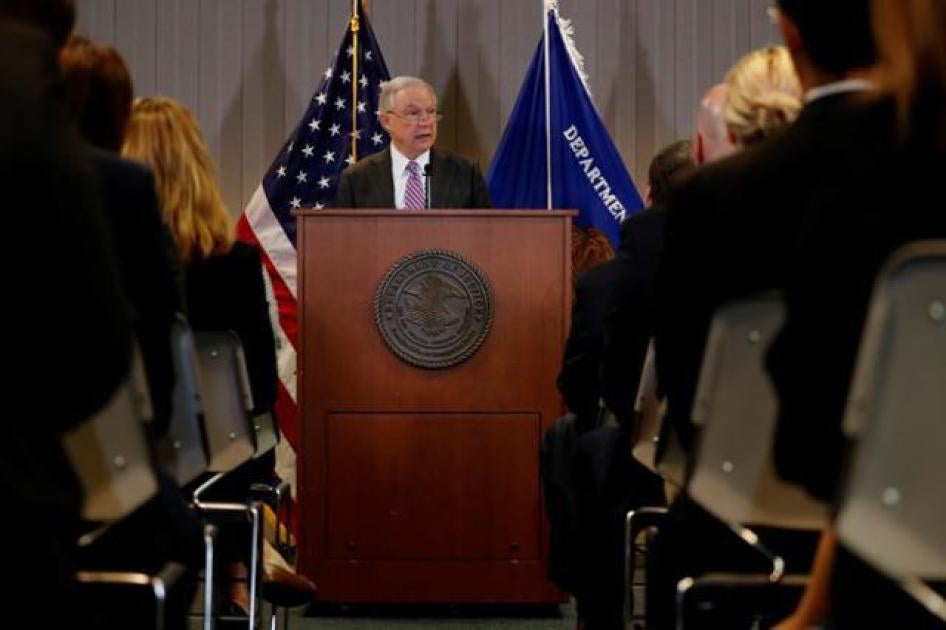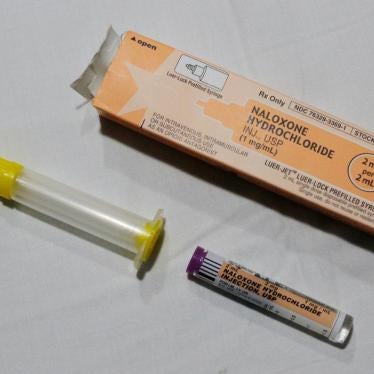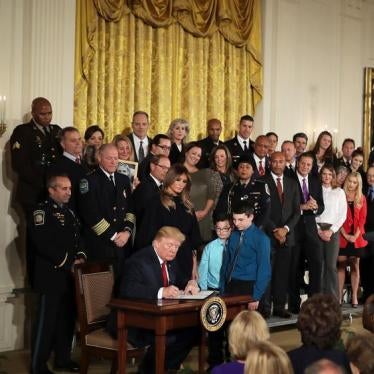In the United States, 142 people die of drug overdoses every day. President Donald Trump has rightly declared a public-health emergency and asked his health secretary to lead the federal response. But law-enforcement agencies also need an approach that puts a premium on public health, particularly as people are increasingly overdosing not on prescription medications but on street drugs like heroin and illicitly produced synthetic opioids such as fentanyl.
So far, however, the Justice Department is sending signals that it will be part of the problem rather than the solution.
In an announcement last month, Attorney General Jeff Sessions made it clear that he will instruct staff to prosecute anyone possessing, selling, manufacturing, or importing a substance containing fentanyl and to subject them to higher penalties than those for heroin use. This may send more people to prison for longer, but more criminal prosecutions of people who use drugs will not curb overdose deaths.
Someone is arrested every 25 seconds in the United States for possessing drugs for personal use. This criminalization of personal drug use and possession has devastated individuals, families, and communities. Punitive approaches drive people who use drugs away from health services and do not reduce injection-drug use, in the United States or globally. Drug courts, endorsed by the Justice Department as a priority, still involve criminal charges and have not been proven to reduce drug use.
But there are alternatives. Public-health-based interventions are known to work, but many of these initiatives are limited by legal barriers or lack of federal support. The Justice Department can help. Here are three steps the attorney general could take that could have a positive and immediate impact on our nation’s opioid epidemic:
1. Increase the number of law-enforcement agencies carrying naloxone.
Naloxone is a safe, generic medication that can bring a person back from an opioid overdose if administered on time. One study in 2012 conservatively estimated that one life is saved for every 164 naloxone kits. Police are often the first responders, particularly in rural areas where ambulance service is not as readily available. More police and sheriff’s departments are carrying naloxone than ever before, but these are still a small fraction of the law-enforcement agencies in the United States.
2. Help states strengthen “Good Samaritan” laws.
The president’s commission also noted the importance of “Good Samaritan” laws that protect people who call emergency services in an overdose situation from arrest or prosecution related to drug use and possession. These laws are necessary because, as multiple studies have confirmed, fear of arrest reduces people’s willingness to call 911 when the person they are with overdoses. The evidence also demonstrates that these laws do encourage calls to emergency services and reduce deaths from overdose.
Most states now have some form of Good Samaritan law, but these laws vary widely and public awareness about them is low. Ten states offer no legal protection to 911 callers. In Arizona, for example, a Good Samaritan bill is pending for the 2018 legislative session. Despite 1,274 deaths from drug overdose in Arizona 2015 and the governor’s declaration of the opioid crisis as a statewide public-health emergency, local advocates expect an uphill battle in the conservative state. A Justice Department endorsement of this life-saving bill could influence Arizona lawmakers, the sheriffs’ association, business owners, and other groups key to its passage.
3. Support a pilot project for supervised-injection facilities.
Supervised-injection facilities are medically and legally sanctioned spaces designed to reduce harm from drug use for both people injecting drugs and their communities. Fearful of arrest and stigmatization, many people use drugs on the street, in cars, in abandoned buildings, and often alone, placing them at greater risk of dying from an overdose.
At supervised-injection facilities, staff provide services such as clean needles and equipment as well as testing for HIV and hepatitis C and linkage to drug-dependence treatment for those who want it. These facilities are operating in 66 cities in nine countries—only underground programs are operating here. These facilities significantly reduce the transmission of infectious disease and overdose deaths without increasing drug use or crime rates. Communities benefit from reduced public drug consumption and hazards such as discarded needles.
These public-health interventions are under consideration in at least six locations in the United States, from California to Baltimore. The Justice Department could support a pilot project in one city by working with local officials to help remove legal barriers and by increasing awareness of the evidence-based public-safety arguments in their favor.
Public safety includes public health, and the United States is in the midst of an emergency. The Department of Justice can, and should, be part of the solution to the nation’s opioid crisis.









